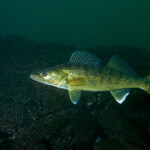Fishermen and conservationists clash over Louisiana’s proposed menhaden buffer zone

The Louisiana Wildlife and Fisheries Commission (WFC) is considering extending a buffer zone prohibiting the commercial harvest of menhaden, also known as pogies, along the coast.
Louisiana introduced a quarter-mile buffer zone stretching across the entire Louisiana coast and a three-mile buffer between Holly Beach and Rutherford Beach this season. On 5 October, the WFC passed a notice of intent to amend the menhaden fishery rules, extending the quarter-mile buffer to a full mile. The new rule would also establish a 48-hour period during which fishermen could retrieve menhaden or bycatch released in that area and increase penalties for violations. Fishermen would need to report details of any release to the Enforcement Division.
The notice of intent follows net spills in September that led to the death of hundreds of thousands of fish. Across three separate incidents, menhaden harvesters Omega Protein, a Cooke company, and Daybrook Fisheries, an Oceana Group company, combined to dump 850,000 menhaden and hundreds of redfish, according to WFC.
“Our area beaches like Holly Beach and Rutherford Beach were covered with rotting carcasses of menhaden and other bycatch,” State Representative Troy Romero wrote to WFC in a letter urging action. “Unfortunately, it seems that these are not rare or isolated incidents. My constituents claim that these beaches are covered with dead fish multiple times per summer after menhaden boats have been in the area fishing near the beaches.”
There have been 18 incidents so far in 2023, according to The Louisiana Sportsman.
Conservationists hailed the state’s move to extend the buffer as a necessary protection, claiming that industrial harvest operations close to shore are harmful to fish and other wildlife.
“This represents a significant step forward in the conservation and management of Louisiana’s fisheries,” Theodore Roosevelt Conservation Partnership Center for Marine Fisheries Director Chris Macaluso said. “The Louisiana Wildlife and Fisheries Commission thankfully has recognized that the concerns of anglers and conservation advocates are valid and that Louisiana’s nearshore habitats need protection from foreign-owned, industrial pogie fishing boats. This is a big win for redfish, speckled trout, mackerel, dolphins, brown pelicans, and a host of other fish and wildlife, and a win for those who appreciate and enjoy Louisiana’s coast.”
“Louisiana’s anglers and recreational fishing businesses depend on healthy habitats and fish populations,” American Sportfishing Association Southeast Fisheries Policy Director Martha Guyas said. “ASA thanks the Louisiana Wildlife and Fisheries Commission for taking this important step toward reducing impacts to coastal resources from the industrial menhaden fishery.”
Menhaden fishing groups Ocean Harvesters and Westbank Fishing are publicly opposed to the proposal, claiming that it will help recreational fishermen at the expense of commercial fishermen.
We believe that this decision is not supported by any scientific evidence and will be economically harmful to the menhaden fishery and Louisiana’s fishing communities,” “We believe Louisiana’s waters should be shared by all user groups. The new coastwide buffer zone is not necessary for menhaden management. Rather, it’s the result of a long-debated, often political, user conflict that’s already been considered and defeated by the Louisiana legislature and this commission. Simply put, these new buffer zones prioritize recreational anglers over commercial fishermen.”
The WFC’s proposal is open for public comment and will still need to pass through the legislature’s natural resources committees before being finalized.
Photo courtesy of the Louisiana Wildlife and Fisheries Commission






Share